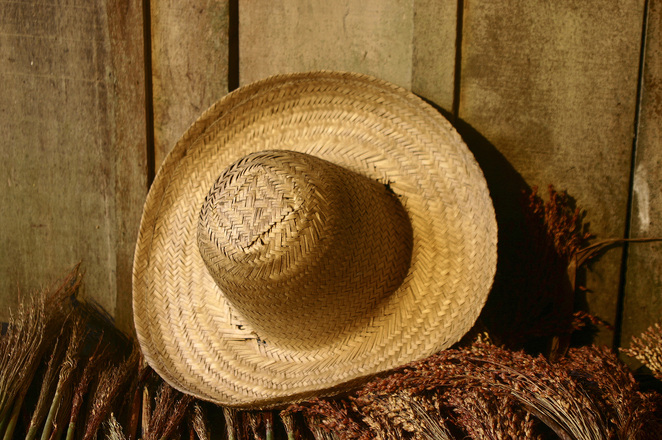
The second hat, wide brimmed and woven of straw, belongs to a man of the farm, my Grandpa Tanner. How could 30 plus years have possibly whisked by since Grandpa was asking about my first days of teaching? His voice is clear like yesterday. As I slipped into the back door of the farmhouse, I still hear him call, “Come on over here.” He pats his knee. Grandpa sits in his upholstered rocker, a flowered sheet protecting it from his farm dirt. Who cares about dirt? Farms were meant for dirt. Grandpas were meant for fun. I hurry over and sit down on a bony knee. Only a brief hesitation slows me with reminders of my age or weight. Never too old for Grandpa’s knee. “Well, how are you doing? How is teaching?” he asks.
His eyes twinkle with genuine interest as I tell him about my fifth-grade students and some of their challenges. Imagine my farmer grandpa wanting to hear about my city ten-year-olds. With his straw hat off, Grandpa’s forehead reveals snow-white skin rarely touched by direct sunlight. It looks wrinkled yet soft. “Well,” he responds as he quietly pushes back his thin black hair, “Now, remember. Only make the rules you really need; then stick to them. Don’t make any rules you don’t want to enforce. You don’t need a lot.”
After a pause Grandpa continues, “And tease a lot. Have fun. Kids have to learn to tease and take teasing. You have to have fun.” I’d heard Grandpa tell of being miserable from teasing when he was a child. I heard him say more than once that his own children and grandchildren would learn to laugh. Grandpa didn’t dwell on the pain; he focused on the future — the future of his children and grandchildren. Little did I know, so many years ago, that his advice would guide my years of teaching. His voice would speak patience. His voice would warn against impulse rules and decisions blurted out from a weary, frustrated teacher.
Shifting my weight a little, I gaze out the large windows at barns and cattle, the vegetable garden and strawberries, poppies and rhubarb. I ask about the cattle and hogs. I envision Grandpa in his straw hat completing his daylight to dark chores. Grandpa wore his straw hat year round. He tilted it high on his head in the hot summer to wipe beads of sweat with a red bandana. At times, he positioned it atop a hooded sweatshirt in the winter. No matter what, the straw hat with the built-in green visor always protected him from the sun, wind, rain, and snow. The last time I saw Grandpa’s hat it was worn and tattered, just like his work clothes.
Truths one and two: few rules; consistency; fun. As I think of Grandpa, another truth comes alive: If it’s not totally worn out, it’s still useful. How often had I watched Grandpa whittle a new end on the mop handle and refit the head? Grandma expertly patched his overalls and the elbows of his work shirts, as though she were sewing for a fine dressmaker. The colorful patches may be obvious, but the sewing is precise and neat. No hanging threads on her patches! Nothing gets tossed in the trash if it still has life.
Grandpa’s clothing smells like hay and the wood stove which heats the house — a strong musty odor of dirt, grass, and cattle. To some it might seem offensive; to me it is rich and bold – the smell of the outdoors; the smell of hard work; the smell of love for the land; the smell of Grandpa. It’s nearly time to leave. I begin to say my good-byes as Grandma offers me a homemade roll. Smiling, I slather on the home churned butter. As I turn, Grandpa calls out, “You know you’re going to be a good cook someday.” I give him quizzically. As the grin spreads across his face, he rubs his leg and continues, “Yes. Good cooks like to eat. You are just like your Grandma. You like to eat.” Be sensitive about my weight and love of Grandma’s rolls or be grateful for a grandpa like my Grandpa Tanner? I choose grateful.